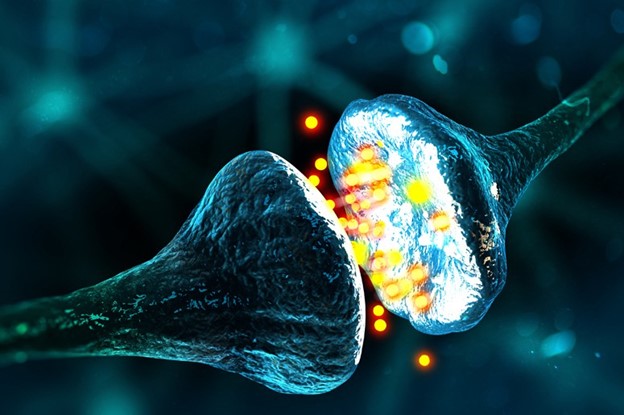Neurochemistry is the study of compounds involving neurotransmitters and other molecules, including neuropeptides and psychopharmaceuticals that control and influence the physiology of the nervous system. This specific field within neuroscience examines how neurochemicals influence neurons, neural networks, and synapses. Neurochemists analyze the molecular biology and biochemistry of organic compounds in the nervous system and their roles in neural processing, including cortical plasticity, neural differentiation, and neurogenesis.
Chemicals as Signals
The complete nervous system relies on electrical signaling in order to perform fast computations between the neurons. It is not surprising that intercellular communication between neurons can be mediated by the action of chemical transmitters and via electrical signaling. Electrical signaling is an important factor of the nervous system and furnishes it with the capability of quick reaction to the changes in the environment. However, synaptic communication between the nerve cells is perceived to be mainly chemically mediated and electrical synapses also occur. Two variant strategies are responsible for electrical communication between neurons.
A chemical to be recognized as a neurotransmitter, it must satisfy six conditions: (1) must be synthesized in the neuron, (2) stored where originated, and (3) released in sufficient quantity to induce some physical effect; (4) when used for experimental purpose, the compound must show the same effect that it brings about in living tissue; (5) there must be receptor sites specific to the substance on the postsynaptic membrane, and (6) a means for shutting off its effect, by swift decomposition or reuptake, reabsorbing into the cell. ACh is widely spread throughout the central nervous system and usually has an excitatory function, but it can also be inhibitory depending on prevailing conditions at the receptor site. Acetylcholine also functions in the autonomic nervous system, such as slowing heartbeat, contracting the pupil of the eye, and stimulating salivation and digestion.
Cocktail of Brain Chemicals

Researchers have currently used a novel technique to form a hypothesis on the origin of rich cognitive abilities. They performed profiling of the chemicals buzzing around our brains. The compounds, known as neurotransmitters, are the signaling molecules responsible for key brain functions. Studies found that in comparison with other higher primates, our brains have unique neurotransmitter profiles that are responsible for our enhanced cognition. As neuroscience is being developed rapidly, researchers are uncovering functional aspects of the complex physiology and anatomy of the human brain, allowing us to have a clearer picture of the depths in which environmental factors influence cognitive and mental health. Some of the neurotransmitters, such as norepinephrine, also act as hormones or affect in releasing of hormones in the body. Adrenaline, melatonin, cortisol, and other hormones are responsible for affecting mood or even influence the health of the brain. The hormone cortisol is secreted when one is stressed; it’s helpful at times, but excess of this hormone can lead to memory loss with age. Maintaining a balance of hormones and brain chemicals is the key to a balanced mood. Chemical imbalances occur due to diseases, aging, injuries, chronic stress, and poor nutrition. Chemical imbalances exist because the neural pathway systems of the brain sometimes lead to emotional pain (such as anxiety) and irrational conclusions.
Brain and Neurotransmitters
Activities such as thoughts, feelings, activities, learning are all conducted by the brain. The circuitry of the emotion of the brain is complex, which involves primary structures in the prefrontal cortex, amygdale, hippocampus, anterior cingulated cortex, and insular cortex. These structures usually work together to process and generate emotional information and behavior. Studies have mainly focused on the prefrontal cortex, which, unlike most other brain regions, involves emotional processing and shows asymmetric activation in relation to positive and negative emotions. Scientists have reported large individual differences in the baseline levels of asymmetric activation in the prefrontal cortex with respect to a person’s emotional style. Individuals with a positive emotional style show left prefrontal activation levels higher than the right at rest, while persons with negative emotional style tend to show levels of right than at left during rest. Studies also showed that negative and positive moods are greatly affected by brain chemicals in various ways. Two important neuro-transmitters that are involved in mood are dopamine and serotonin. Positive mood is mainly known to be associated with increased levels of dopamine in the brain. Serotonin is a neurotransmitter that mediates satisfaction, optimism, and happiness. Serotonin levels become reduced in depression, and current anti-depressant drugs such as serotonin reuptake inhibitors (SSRIs) act by increasing the amount of serotonin available to brain cells.

Norepinephrine – is another neurotransmitter and is associated with the level of happiness. Anti-depressants such as the selective norepinephrine reuptake inhibitor induce a positive emotional, perceptual bias in healthy subjects suggesting that norepinephrine positively colors the emotional perception of facial expressions in humans. Norepinephrine regulates neuronal excitability in the basolateral amygdale by facilitation of GABA release that demonstrates a potential neuroanatomical locus for effect. Endorphins are endogenous opioid peptides that function as neurotransmitters also are associated with positive mood. Melatonin/n- acetyl- 5- methoxytryptamine – a hormone produced by the pineal gland in the brain during the night, is linked with the body to get ready for sleep.
Neurotransmitters play a significant role in the functioning of the human body. A balance of neurotransmitters is necessary to prevent certain health conditions, such as anxiety, depression, Alzheimer’s, and Parkinson’s disease. It is yet to ensure that neurotransmitters remain balanced and work correctly. However, having a healthy lifestyle, including regular exercise and stress management, benefit in managing the disease conditions.

